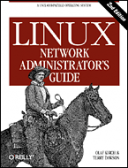Книга: Linux Network Administrator Guide, Second Edition
Choosing the Right Maps
Choosing the Right Maps
Having made sure you can reach the NIS server, you have to decide which configuration files to replace or augment with NIS maps. Commonly, you will want to use NIS maps for the host and password lookup functions. The former is especially useful if you do not have the BIND name service. The password lookup lets all users log into their accounts from any system in the NIS domain; this usually goes along with sharing a central /home directory among all hosts via NFS. The password map is explained detail in the next section.
Other maps, like services.byname, don't provide such dramatic gains, but do save you some editing work. The services.byname map is valuable if you install any network applications that use a service name not in the standard services file.
Generally, you want to have some choice of when a lookup function uses the local files, when it queries the NIS server, and when it uses other servers such as DNS. GNU libc allows you to configure the order in which a function accesses these services. This is controlled through the /etc/nsswitch.conf file, which stands for Name Service Switch, but of course isn't limited to the name service. For any of the data lookup functions supported by GNU libc, the file contains a line naming the services to use.
The right order of services depends on the type of data each service is offering. It is unlikely that the services.byname map will contain entries differing from those in the local services file; it will only contain additional entries. So it appears reasonable to query the local files first and check NIS only if the service name isn't found. Hostname information, on the other hand, may change very frequently, so DNS or the NIS server should always have the most accurate account, while the local hosts file is only kept as a backup if DNS and NIS should fail. For hostnames, therefore, you normally want to check the local file last.
The following example shows how to force gethostbyname and gethostbyaddr to look in NIS and DNS before the hosts file and how to have the getservbyname function look in the local files before querying NIS. These resolver functions will try each of the listed services in turn; if a lookup succeeds, the result is returned; otherwise, they will try the next service in the list. The file setting for these priorities is:
# small sample /etc/nsswitch.conf
#
hosts: nis dns files
services: files nis
The following is a complete list of services and locations that may be used with an entry in the nsswitch.conf file. The actual maps, files, servers, and objects queried depend on the entry name. The following can appear to the right of a colon:
nis
Use the current domain NIS server. The location of the server queried is configured in the yp.conf file, as shown in the previous section. For the hosts entry, the hosts.byname and hosts.byaddr maps are queried.
nisplus or nis+
Use the NIS+ server for this domain. The location of the server is obtained from the /etc/nis.conf file.
dns
Use the DNS name server. This service type is useful only with the hosts entry. The name servers queried are still determined by the standard resolv.conf file.
files
Use the local file, such as the /etc/hosts file for the hosts entry.
compat
Be compatible with older file formats. This option can be used when either NYS or glibc 2.x is used for NIS or NIS+ lookups. While these versions normally can't interpret older NIS entries in passwd and group files, compat option allows them to work with those formats.
db
Look up the information from DBM files located in the /var/db directory. The corresponding NIS map name is used for that file.
Currently, the NIS support in GNU libc caters to the following nsswitch.conf databases: aliases, ethers.group, hosts, netgroup, network, passwd, protocols, publickey, rpc, services, and shadow. More entries are likely to be added.
Example 13.2 shows a more complete example that introduces another feature of nsswitch.conf. The [NOTFOUND=return] keyword in the hosts entry tells the NIS client to return if the desired item couldn't be found in the NIS or DNS database. That is, the NIS client will continue searching the local files only if calls to the NIS and DNS servers fail for some other reason. The local files will then be used only at boot time and as a backup when the NIS server is down.
Example 13.2: Sample nsswitch.conf File
# /etc/nsswitch.conf
#
hosts: nis dns [NOTFOUND=return] files
networks: nis [NOTFOUND=return] files
services: files nis
protocols: files nis
rpc: files nis
GNU libc provides some other actions that are described in the nsswitch manpage.
- Choosing an MTA
- Chapter 13. The Network Information System
- 4.4.4 The Dispatcher
- About the author
- Chapter 7. The state machine
- Appendix E. Other resources and links
- Example NAT machine in theory
- The final stage of our NAT machine
- Compiling the user-land applications
- The conntrack entries
- Untracked connections and the raw table
- Basics of the iptables command




